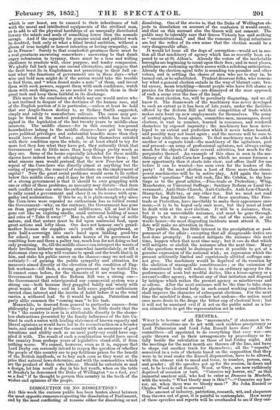DISSOLUTION OR NO DISSOLUTION?
An this week the curious public has been beaten about between the most opposite rumours respecting the dissolution of Parliament, and by the most conflicting of reasons either for dissolving or not
dissolving. One of the stories is, that the Duke of Wellington ob- jects to dissolution on account of the confusion it would create, and that on this account also the Queen will not consent. The public may be tolerably sure that Queen Victoria has said nothing so "unconstitutional," and that the rumours of Royal reluctance are but the reflex of its own sense that the election would be a very disagreeable affair..
It It would let loose all the dogs of corruption—would set in mo- tion all that machineryof agency which has so recently been ex- poied to us at St. Alban's. Already the voters of the marketable boroughs are beginning to count upon their fees; and in most places, publicans are reckoning up their scores with a relishing anticipation. Already the election-agent tribe is sounding ten-pounder and other voters, and is settling the choice of men who are to stay in, be turned out, or be substituted. Prudent decorous folks, who remem- ber what a general election entails in the way of blatant cant, bru- tal excess, mean truckling—decent people who have felt shame as proxies for their neighbours—are dismayed at the near approach of such a scene over the face of the land.
The next election, too, will be peculiarly disgusting, and we all know it. The framework of the machinery was never developed to such an extent as it has been of late years, under the facilities offered by the Reform Bill and that competition of trade which makes men hunt up new employments for themselves. The army of central agents, local agents, committee-men, messengers, decoy electors, is vast in number, learned in resources, and rendered shameless by exposed. impunity ; the machinery has been deve- loped to an extent and perfection which it never before boasted, and possibly may not boast again ; and the movers will be sure to make hay while the sun shines. To that machinery may be added another of a cognate kind—the machinery of the agitations, past and present—an army of professional agitators, not always caring much for the objects of their several activities, but much for the perquisites thereof. An example of this class is seen in the ma- chinery of the Anti-Corn-law League, which no sooner foresees a new opportunity than it starts into view, and offers itself for use before it can be wanted—too soon even for the leaders of the party ! At the next election a host of these more-than-steam- power machineries will be in active play. Add again the innu- merable " questions " that will rush, like Mr. Cobden, to the hus- tings as to the great arbiter,—Free-trade or Protection ; Whig, Manchester, or Universal Suffiuge ; Sanitary Reform or Loral Go- vernment; Anti-State-Church, Anti-Catholic, Anti-Low-Church ; Stamp-tax, Malt-tax, or any other tax. But we need not read over the long familiar list. Some of these questions,- like Free- trade or Protection, have inevitably to make their appearance once more,—it is to be hoped only once more, but they must at least be dealt with at the next election. It will be a nuisance, then, but it is an unavoidable nuisance, and must be gone through. Happen when it may—now, at the end of the session, or six weeks hence—its most disgusting incidents must attend it. The date will make no alteration in them.
The public, then, has little interest in the precipitation or post- ponement of the affair ; excepting that all disagreeable duties are best done promptly. It cannot mitigate the nuisance this next time, happen when that next time may; but it can do that which will mitigate or abolish the nuisance after the next time. Many of the questions would be destroyed were it possible to get at a genuine expression of the national wish; an expression which the present arbitrarily limited and capriciously allotted suffiugo can- not give. The machinery, would be deprived of its vocation. by the abolition of manageable constituencies ; or the extension of the constituent body will reduce it to an ordinary agency for the performance of none but needful duties, like a house-agency or a servant's-office agency, without any of that initiation and disposal by intrigue which makes the present agency so mischievous and so odious. After the next nuisance will be the time to take steps for placing the electoral body in such sound working condition as shall improve the character of subsequent elections. For the next time the mischief is done, or rather not undone—the nation must once more drain to the dregs the bitter cup of electoral beer; but it will not be unmixed evil if it act on the public mind as a les- son stimulative to get the representation set m order.


























 Previous page
Previous page